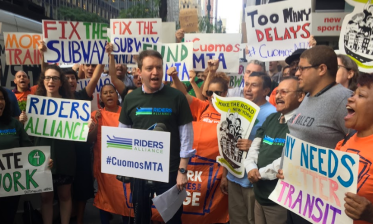It’s Cuomo vs. Transit Experts on MTA Funding
Yesterday, Governor Andrew Cuomo called the region’s transit investment plan “bloated” and rejected calls for new revenue. Today, MTA Chairman and CEO Tom Prendergast, speaking at a forum on best practices in regional transit governance, hammered home the need for elected officials to find new money to fill the half-funded capital plan’s $15 billion gap.

“This is the start of a process. This is the start of a dialogue,” Prendergast told reporters when asked about the governor’s comments. He refused to agree with the governor’s assertion that the capital plan should be trimmed, and indicated that without new funding, the MTA would resort to increasing its debt load above already record levels. “I don’t like greater debt finance, but I’ll tell you what,” he said during the panel, “I’ll treat that finance as a bridge to another day.”
Today, debt service eats up an ever-greater share of the authority’s budget, with the MTA spending almost as much in debt service as it does to operate Metro-North and Long Island Rail Road service combined. During his comments yesterday, Cuomo also repeated his rejection of toll reform or other new sources of revenue to help fill the capital program’s gap and reduce the MTA’s reliance on debt.
“At some point the interest payments on MTA debt are going to completely implode any capacity to do anything for the MTA going forward,” said Chris Ward, Dragados USA executive vice president and former Port Authority executive director. “The toll structure has reached [the end of] its useful life,” he said. “Public transit is going to have to face, fundamentally, a question of funding, and what the mechanisms are going to be.”
The panel this morning, hosted by the Eno Center for Transportation, TransitCenter, and the Regional Plan Association, marked the release of a new report examining the governance of regional transit systems in New York, Boston, Chicago, San Francisco, Dallas, and the Minneapolis-St. Paul area [PDF].
While panelists noted that New York often serves as a model for other systems, the MTA came in for serious criticism on the way it is governed by its board members and the governor who appoints them.
New York’s governor calls the shots with state authorities, noted Robert “Buzz” Paaswell, director of the University Transportation Research Center at City College. During a training for board members of state authorities, Paaswell asked them if they would disagree with the governor if his wishes contradicted the best interests of the authority. “Ninety percent of the board members would say, ‘I would do what the governor says; he appointed me,'” he said. “Even if that goes against the interest of the authority.'”
“If the governor is in charge of every single appointment to a board, you’re going to see outcomes that the governor cares about,” said Eno President and CEO Joshua Schank. “[In] New York in particular, it may be that his constituency is more in suburban areas, where that may be a place where capital investments are prioritized.” Today, all board members are appointed by the governor, some on the recommendation of local officials; Schank called for more direct representation of New York City on the board.
Prendergast pushed back against suggestions that the MTA board pays too little attention to the city and too much to the governor’s political goals. “If you look at a governance structure put in place in 1968, it has fared well,” he said, later naming appointees that live in the city. “Does it have imperfections? Yes. Does it have problems that need to be improved upon? Yes, absolutely.”
Ultimately, Prendergast dismissed debates over the MTA’s governance as a distraction. “We’re wasting resources and time and spending political capital that could be better spent dealing with the funding issue,” he said, “The funding issue is the underlying issue.”
Public-private partnerships came up as a potential solution. “There are some core competencies that are not ours that maybe public-private partnerships would be better suited for. Mega-projects, for example,” Prendergast said, adding that the MTA already has the ability to execute design-build contracts and does not rely upon a state law set to expire at the end of the year.
Ward, whose firm is involved in public-private partnerships, cautioned against seeing them as a revenue source. “P3s are not going to be the funding cure-all,” he said. “It’s finance, not funding. Someone’s going to need to get paid back.”
Earlier this year, Cuomo appointed the Transportation Reinvention Commission to create a blueprint for the MTA, including its funding needs. Over the summer, consultants for the commission said a report would be out in the first week of September. An MTA spokesperson said today that while drafts are circulating, there is no release date scheduled for the final report.
As the funding back-and-forth looks set to continue over the coming months, Prendergast seemed confident that in the end, the MTA will receive the funding it needs. “There’s four quarters to this game and we’ve got a long way to go,” he said. “When the deal needs to get done, it gets done and the money is there.”
